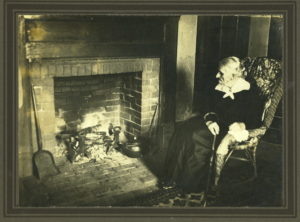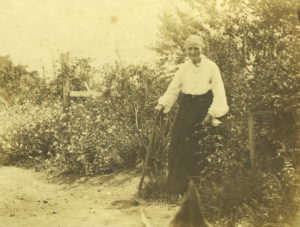
Lucy Hawkins (1828-1922) was the youngest of 6 children of Jane Walker Hawkins and Dr. Martin Hawkins. She attended the Sophia Sawyer Female Seminary in Fayetteville. In 1844, she married Edward Freyschlag, when Edward was 30 and Lucy was just 15 years old. The first of their 5 children, T.C. Mullins’s mother Sophie Sawyer Freyschlag, was born in June 1845, when Lucy was just 16 ½ years old. The story of the Hawkins and Walker families is an interesting one.
Lucy’s father Martin Luther Hawkins was a frontier doctor whose patients might have infections, fractures, or arrow wounds. Sadly he died young, when Lucy was just 12 years old. Her mother, Jane Curl Walker, was left as a frontier widow with 5 children. She moved the family to Fayetteville where her cousin Judge David Walker helped by providing the family with a home and a stove, as recounted in one of letters in the Jane Curl Walker Letters.
Lucy lost 2 brothers in military campaigns. Her brother James traveled to California in 1849 in search of gold, then joined a group of filibusteros, mercenary soldiers fighting in Mexico. He was captured and sent back to the United States with yellow fever, and died at Charity Hospital in New Orleans in 1856. Lucy’s brother Martin Jr. enlisted with the Confederate Army in 1861 and was killed in the first major battle of the Civil War west of the Mississippi, the Battle of Wilson’s Creek. He was shot with a minie ball to the forehead. Such was the rough life in frontier America in the mid-1800s.

Lucy’s husband, Edward Freyschlag, was 19 years old when he and Babette accompanied their father to this country. He traveled back to Germany, and brought his mother and 9 younger siblings back across the Atlantic to New Orleans on Les Deux Soeurs, then up the Mississippi on the steamboat Veteran to Fayetteville, arriving March 9, 1835. Edward was reportedly an accomplished pianist, and in fact brought a piano to Fayetteville from Germany on this second voyage. Family lore states that Edward worked hard to eliminate his German accent. He refused to speak German after his immigration to this country.
On October 12, 1840, Edward appeared in court to be granted U.S. citizenship. According to census records, he worked as a blacksmith for many years, in addition to milling and farming.
© 2013 W. Mullins
